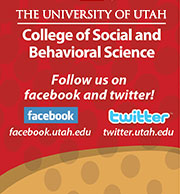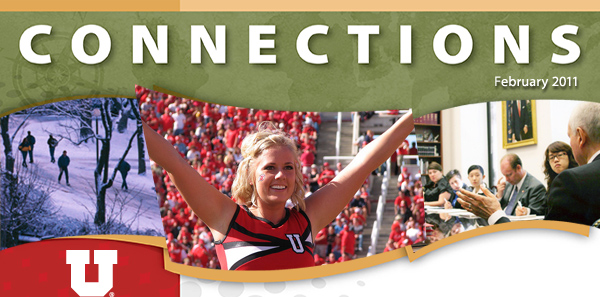February 2011 Newsletter
 |
SAVE THE DATEThe Barbara L. and Norman C. Tanner Center for Nonviolent Human Rights Advocacy presents the Fifth Annual International Conference on Human Rights, Conflict Resolution, Nonviolence, and Peace February 23-25. This year’s topic will investigate the difficulties facing humanity and water shortages entitled “Water, Conflict and Human Rights: Emerging Challenges and Solutions. The opening keynote and reception will commence February 23 at 7:00 PM in the Dumke Auditorium at the Museum of Fine Arts in the Marcia and John Price Museum Building with Maude Barlow. See the full program and list of speakers.- opens new window Zooarchaeology and field ecologyThe Anthropology Department is pleased to be offering anew summer field school in
Zooarchaeology and Field College KudosPublic Administration- opens new window is proud to announce the publication of two new books by their faculty: Lina Svedin (Ed.) (2011) Ethics and Crisis Management. Information Age Publishing. Scott H. Ainsworth and Thad E. Hall (2011) Abortion Politics in Congress: Strategic Incrementalism and Policy Change. Cambridge University. Two students from the Geography Department- opens new window have earned recognition for their outstanding work: Jesse Morris, a graduate student in the Ph.D. program, has been named a winner of the Early Scientist Award. Jesse attended the International Biogeography Society meeting held in Crete in January 2011. Jonathan Williams, a Junior majoring in geography and president of the local chapter of the geography honor society Gamma Theta Upsilon (GTU), has been selected for an internship with the National Geospatial-Intelligence Agency (NGA), a Department of Defense combat support agency. |

CSBS Student Ambassadors Selected
The College selected eight students to initiate the first CSBS Student Ambassador team. This team of students is charged with creating more student engagement within the college, on campus and within the community. Read the full story
 CPPA Legislative Policy Summit
CPPA Legislative Policy Summit
On January 14 the 2nd annual Legislative Policy Summit was held. The College's own Center for Public Policy and Administration sponsors the Summit along with the Exoro Group and Zions Bank. The summit aims to inform legislators, lobbyists and business leaders about some of the hot topics for Utahns. This year, the CPPA and Exoro Group contracted with Dan Jones & Associates to prepare the 2011 Legislative Policy Summit Survey. One of the questions posed assessed residents' attitudes and opinions about many issues facing the state on the eve of another legislative session. The top five concerns were: (1) Education (2) Health Insurance/Health Reform (3) Economy (4) Unemployment/Jobs (5) Taxes. Read more about the survey
Myth: Immigrants Hurt Utah's Economy 
Every year immigrants send money they've earned in the states back to their home countries. In 2009 Latin America and the Caribbean received $42.3 billion in remittances from immigrants in the U.S. “I suppose someone could make the case Utah’s economy would be better off if that money were spent here,” says Thomas Maloney, an associate professor of economics at the University of Utah speaking to the Salt Lake Tribune. “But thinking about the bigger picture, you also could argue many of those recipients will have more money to spend on U.S.-produced goods.” Many maintain that undocumented immigrants are hurting Utah’s economy because they don’t pay taxes, which Maloney believes is rubbish. “They pay sales taxes like everyone else,” says Maloney. “They pay property taxes either implicitly or through their monthly rent.” In fact most undocumented workers pay into the welfare system without ever reaping the benefits of Social Security or Medicare, extenuating that claim. The result is undocumented workers actually pay far more in overall taxes than they receive in benefits. Read more
 Guv Not Afraid to Flex Political Muscle Against Fellow Republicans
Guv Not Afraid to Flex Political Muscle Against Fellow Republicans
Governor Herbert and Utah legislators may be at odds. Herbert’s proposal for the budget of the 2012 Fiscal Year was swiftly denied by the legislature. Herbert’s request was to maintain the stability of state departments while providing additional money for public schools. House Republicans, meanwhile, are hoping for a seven percent cut in spending. “It’s surprising to see the Legislature picking this fight with the governor and testing him,” says Matthew Burbank, professor of political science. “Maybe he will be a little less anxious to avoid any conflicts with the Legislature.” See the full article.
 Quality of Life in Utah Witnessing Ups (and Downs)
Quality of Life in Utah Witnessing Ups (and Downs)
The Genuine Progress Indicator (GPI) incorporates many factors that contribute, as well as deduct, from our quality of life. The study, which can be seen here, indicates that the overall quality of life is improving. However, several critical factors to our well-being are eroding. In relation to the state's GDP the aggregate GPI has risen but at a protracted rate since 1990. Overall personal consumption and income have also risen but economic equality has suffered. This is indicated by an increase in underemployment and net capital investment in the wake of the national economic meltdown. Positives indicated by the study point out a decrease since 1990 in the divorce rate, vehicle crashes, and the crime rate. Meanwhile commuter time and distance, leisure, and environmental conditions have deteriorated. Poor air quality alone has contributed to health costs, property damage, and agricultural degradation.
 Poor Neighborhoods a Cornucopia of Bad Health
Poor Neighborhoods a Cornucopia of Bad Health
Utah is one of the healthiest states in the nation but according to the Utah Department of Health and professors at the U, the west side of Salt Lake City is “a ghetto of poor health.” Residents here are less likely to have access to medical care than most Utahns, having some of the worst health in some of the most polluted sections. Economics professor Norman Waitzman and family and consumer-studies professor Ken Smith have published studies showing Americans with identical income, education, and race living in poor neighborhoods died at a higher rate than those in less stressed neighborhoods. "It can be as risky as smoking to your risk of mortality," says Waitzman, who added that those living in these neighborhoods are twice as likely to die during middle age. Read the full article
 Disparities Between Gay and Straight Youths Far Smaller Than Once Thought
Disparities Between Gay and Straight Youths Far Smaller Than Once Thought
Gay teens and young adults have long been believed to be at a greater risk of suicide than their straight counterparts. However, recent studies suggest that many of the reasons for suicide among youths are very much the same, gay or straight. In a recent New York Times article Lisa Diamond, associate professor of psychology and gender studies at the University of Utah, suggests that young gays have as many friends and are just as popular and socially connected as other teenagers and suffer from the same main stressor: “anxiety about being alone as an adult, about finding the kind of partner they want,” says Diamond. Studies suggest that dangerous thoughts are higher amongst gay youths, but Diamond says the effects of bullying and discrimination are often blown out of proportion by the media. Diamond and other researchers point out that only the negative aspects are published and the positives are often overlooked.
 Student Veterans Study
Student Veterans Study
Dean David Rudd of the College of Social and Behavioral Sciences at the University of Utah and the Center for Veterans Studies is partnering with Student Veterans of America to conduct a survey to better the experience and transition of veterans in higher education. We are asking all veterans to please take this survey and help us give you the best university experience possible. This study is designed to assess veteran's experiences on college and university campuses in order to ease transition into college life and alleviate stress and other issues they may be experiencing.
 LEAD with Love
LEAD with Love
David Huebner, associate professor in psychology at the University of Utah, has produced a 5-minute documentary to help parents who have recently learned that their son or daughter is lesbian, gay, or bisexual. You can see the film for free online at leadwithlovefilm.com. Lead With Love follows four families' experiences in learning that they have a gay or lesbian child. Created for parents who are working through this news themselves, this poignant and informative film shares real stories from parents and children, factual information from psychologists, educators, and clergy, and concrete guidance to help parents keep their children healthy and safe during this sometimes challenging time. A screening of the film, followed by a panel discussion with the creative team and some of the families who appear in the film, took place at the Salt Lake City Main Library on January 19th.

